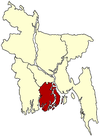Babuganj Upazila
| Babuganj বাবুগঞ্জ | |
|---|---|
| Upazila | |
 Babuganj Location in Bangladesh | |
| Coordinates: 22°49.9′N 90°19.3′E / 22.8317°N 90.3217°ECoordinates: 22°49.9′N 90°19.3′E / 22.8317°N 90.3217°E | |
| Country |
|
| Division | Barisal Division |
| District | Barisal District |
| Area | |
| • Total | 164.88 km2 (63.66 sq mi) |
| Population (1991) | |
| • Total | 135,905 |
| • Density | 820/km2 (2,100/sq mi) |
| Time zone | BST (UTC+6) |
| Website | Official Map of the Babuganj Upazila |
Babuganj (Bengali: বাবুগঞ্জ) is an Upazila of Barisal District in the Division of Barisal, Bangladesh.[1]
Geography
Babuganj is located at 22°49′55″N 90°19′20″E / 22.8319°N 90.3222°E . It has 25,144 households and a total area of 164.88 km².
Demographics
According to the 1991 Bangladesh census, Babuganj had a population of 135,905. Males constituted 50.58% of the population, and females 49.42%. The population aged 18 or over was 66,984. Babuganj had an average literacy rate of 47.4% (7+ years), compared to the national average of 32.4%.[2]
Points of interest
Durgasagar
Durgasagar with an area of about 2,500 hectare, is the largest pond or dighi of southern Bangladesh. It is located at Madhabpasa village of Babuganj upazila, about 11 km away from Barisal town. Locally it is known as Madhabpasha Dighi. According to a desire of Rani Durgavati, mother of Raja Joynarayan, the dighi was dug in 1780 (1187 BS). Initially there were four pucca ghats each having 15m width. Due to the lack of proper maintenance jungles gradually surrounded the dighi. However, in 1975, government renovated it to some extent. There are coconut trees around the dighi which together with the dighi are bounded by brick-walls. There are two gates each on the eastern and western sides of Durgasagar. In the middle of the dighi, there is an island with bushes. Migratory birds usually come here during winter. The surrounding areas of the dighi are now being used as a picnic spot. Presently, Barisal Development Board is looking after it.
Administration
Babuganj has 6 Unions/Wards, 86 Mauzas/Mahallas, and 87 villages.
- Rahomatpur
- Chandpasha
- Kedarpur
- Madhabpasha
- Agurpur
- Dehergoti
References
- ↑ Masud Parvez (2012). "Babuganj Upazila". In Sirajul Islam and Ahmed A. Jamal. Banglapedia: National Encyclopedia of Bangladesh (Second ed.). Asiatic Society of Bangladesh.
- ↑ "Population Census Wing, BBS.". Archived from the original on 2005-03-27. Retrieved November 10, 2006.
